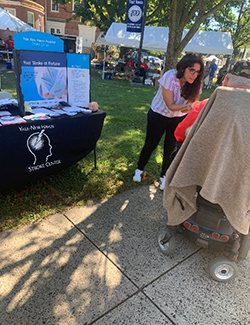
Popular Locations
- Yale New Haven Children's Hospital
- Yale New Haven Hospital - York Street Campus
- Yale New Haven Hospital - Saint Raphael Campus

Thanks to the acronym BE FAST, more people are aware of some of the classic signs of stroke, including face drooping, balance problems, speech difficulty and arm weakness.
What people might not know is that a person having a stroke doesn’t have to display all of the symptoms. Any one, or a combination, can indicate a life-threatening emergency (see related accompanying information). This is the kind of information experts with the Stamp Out Stroke program share at the events they attend each year throughout Greater New Haven.
A stroke occurs when blood flow to the brain is reduced or interrupted. Deprived of adequate nutrients, brain cells can begin to die within minutes.
“Educating people about stroke symptoms is vital, because the more people know what to watch for, the faster a stroke patient can get treatment,” said Ranisha Parker, RN, outreach and integration coordinator, Yale New Haven Stroke Center. “Timely treatment can help preserve brain function and potentially save lives.”
Led by the Yale New Haven Stroke Center, the Stamp Out Stroke program comprises nurses, physicians, neurology residents and physician and nursing students. They staff tables and booths at fairs, charity walks and other events and visit community organizations to educate people about stroke risk factors, warning signs and the importance of prompt care. The Stamp Out Stroke team adapted to COVID restrictions by holding virtual lectures for various organizations. With some restrictions lifted, team members have resumed many in-person activities, following safety protocols. Already this year, program staff and physicians have attended 10 events, with more scheduled. They talked to more than 235 people at four different events during September alone.
This kind of outreach benefits members of the community and the clinicians who care for them.
“The importance of healthcare workers connecting with our local community cannot be overstated,” said neurologist Rachel Forman, MD. “To provide excellent care, we need to understand the needs of our patients. We must go further than providing resources that may never be accessed; we need to engage with people and listen to firsthand accounts about the many and complex roadblocks that hinder prevention.”
The acronym BE FAST is an easy way to remember the signs of stroke

Mona Al Banna, MD, neurovascular fellow, recently spoke to visitors at the West Haven Apple Festival as part of the Stamp Out Stroke program. Led by the Yale New Haven Stroke Center, the program aims to educate people about stroke risk factors, symptoms and the importance of immediate treatment.